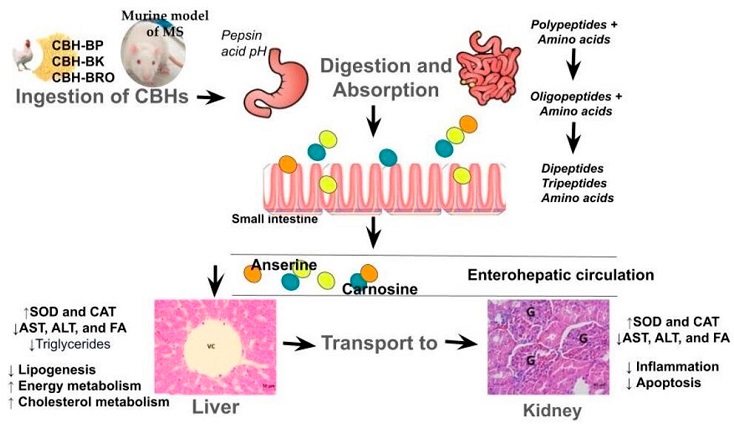Chicken Byproduct Peptides Show Promise in Tackling Liver and Kidney Damage from Metabolic Syndrome
Nikhil Prasad Fact checked by:Thailand Medical News Team Nov 11, 2024 1 year, 1 month, 1 week, 17 hours, 34 minutes ago
Medical News: Metabolic syndrome (MS) is a complex health condition marked by issues such as obesity, high blood pressure, and blood sugar, which can increase the risk of severe health complications. Research is exploring various treatments for MS, and one innovative approach has emerged from a study examining peptides derived from chicken byproducts. A team of researchers from Tecnológico Nacional de México, Universidad Autónoma de Nuevo León, Universidad Autónoma de Nayarit, and the University of Texas MD Anderson Cancer Center-USA, investigated how these peptides could potentially alleviate liver and kidney damage in an animal model of MS. This
Medical News report highlights the exciting potential of these bioactive compounds.
 Schematic diagram that illustrates the possible mechanisms of action proposed for CBH to generate a therapeutic effect on the liver and kidney.
Study Overview
Schematic diagram that illustrates the possible mechanisms of action proposed for CBH to generate a therapeutic effect on the liver and kidney.
Study Overview
In this study, researchers used peptides derived from chicken byproducts, specifically targeting their effects on liver and kidney tissues in rats with induced metabolic syndrome. The animal subjects were divided into groups, with some receiving a standard diet, others a high-calorie diet to induce MS, and treatment groups receiving either carnosine or different chicken byproduct hydrolysates (CBHs) extracted using specific plant-based enzymes.
Key Findings
The researchers found that CBHs provided significant protection to both liver and kidney tissues. Liver tissues in MS-induced rats typically showed signs of cellular damage, lipid accumulation, and inflammation. However, treatment with CBHs led to notable reductions in these adverse effects. In the liver, the study recorded lower lipid inclusions, reduced vascular congestion, and improved cellular structure in animals treated with CBH. Notably, the liver cells displayed fewer lipid droplets, which indicates less fatty buildup - a common problem in MS-related liver damage.
Similarly, in the kidney tissues, CBH treatments reduced damage signs like tubular degeneration and vascular congestion. Histological analysis revealed that CBH-treated rats had healthier kidney structures compared to those not receiving the treatment, with lower levels of tissue inflammation and less dilation of kidney structures. This kidney protection may be crucial since kidneys in MS patients often face a range of stressors that heighten the risk of chronic kidney disease.
Mechanisms of Action
The therapeutic effect observed in the study is likely due to the antioxidant and anti-inflammatory properties of the bioactive peptides. Bioactive peptides are small protein fragments with unique structures that allow them to interact at a cellular level, influencing pathways involved in reducing oxidative stress and inflammation. Researchers believe that these CBHs can support cellular repair mechanisms, particularly in liver and kidney cells, which are frequently damaged by MS. Additionally, the study suggests that these peptides could play a role in regula
ting lipid metabolism, preventing excessive fat accumulation in liver cells.
Therapeutic Implications
CBHs derived from chicken byproducts could serve as a natural, cost-effective therapeutic option for people with MS, offering a way to reduce liver and kidney damage without relying heavily on pharmaceuticals. Since metabolic syndrome affects millions worldwide, especially in regions with high rates of processed food consumption, finding accessible therapies is critical.
Conclusion
In summary, this study supports the idea that peptides from chicken byproducts might offer a protective effect for individuals with MS, particularly concerning liver and kidney health. The findings encourage further research to understand the precise biological pathways these peptides influence and to explore potential therapeutic uses in human models.
The study findings were published in the peer-reviewed journal: Biologics.
https://www.mdpi.com/2673-8449/4/3/21
For the latest on Metabolic Syndrome, keep on logging on to Thailand
Medical News.
Read Also:
https://www.thailandmedical.news/news/thailand-medical-researchers-discover-immunity-and-cancer-fighting-potential-in-peptides-of-white-jellyfish
https://www.thailandmedical.news/news/egyptian-randomized-trial-finds-that-cerebrolysin-peptides-from-pig-brains-can-treat-post-covid-19-olfactory-gustatory-and-chemosensory-dysfunctions
